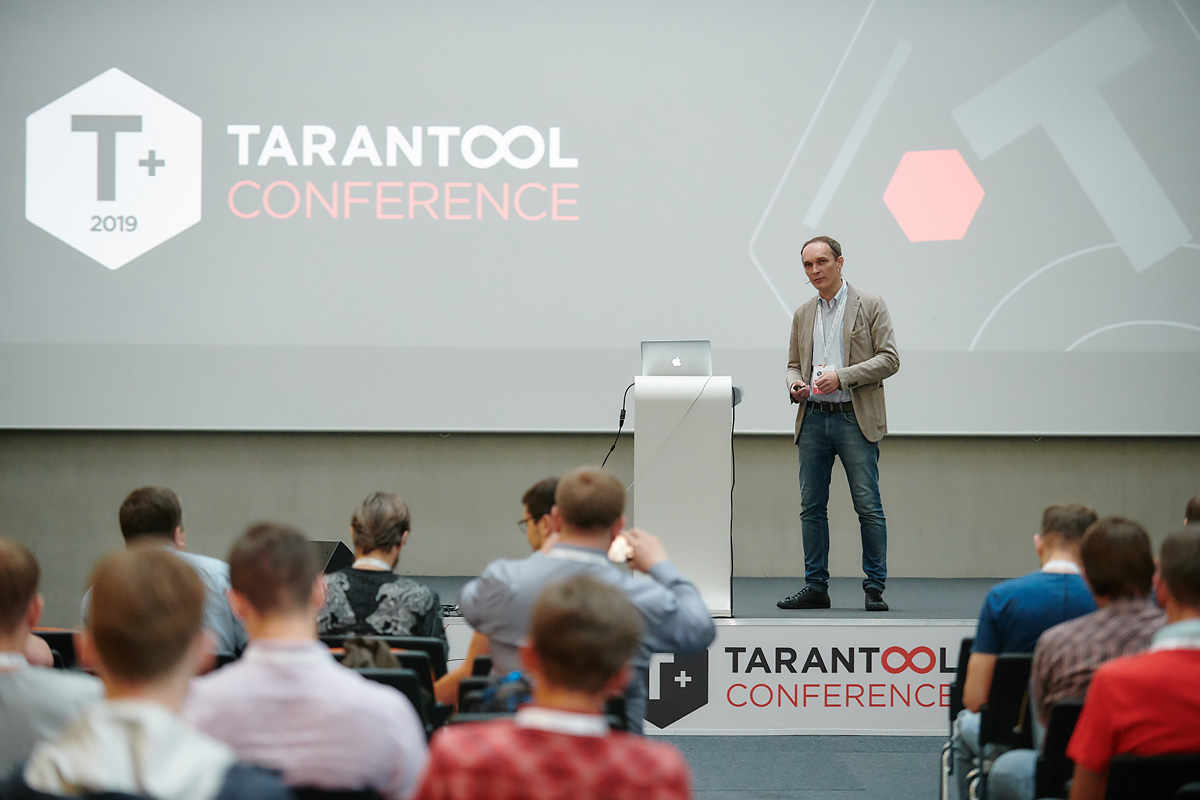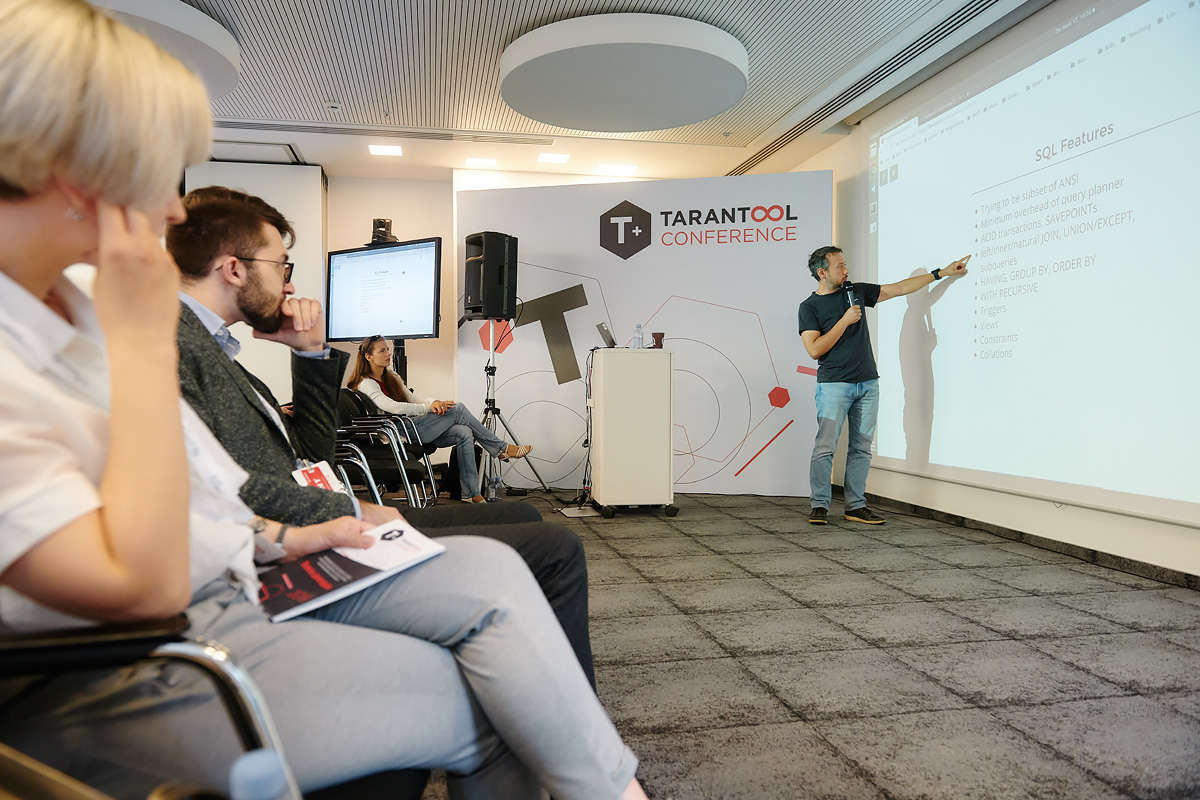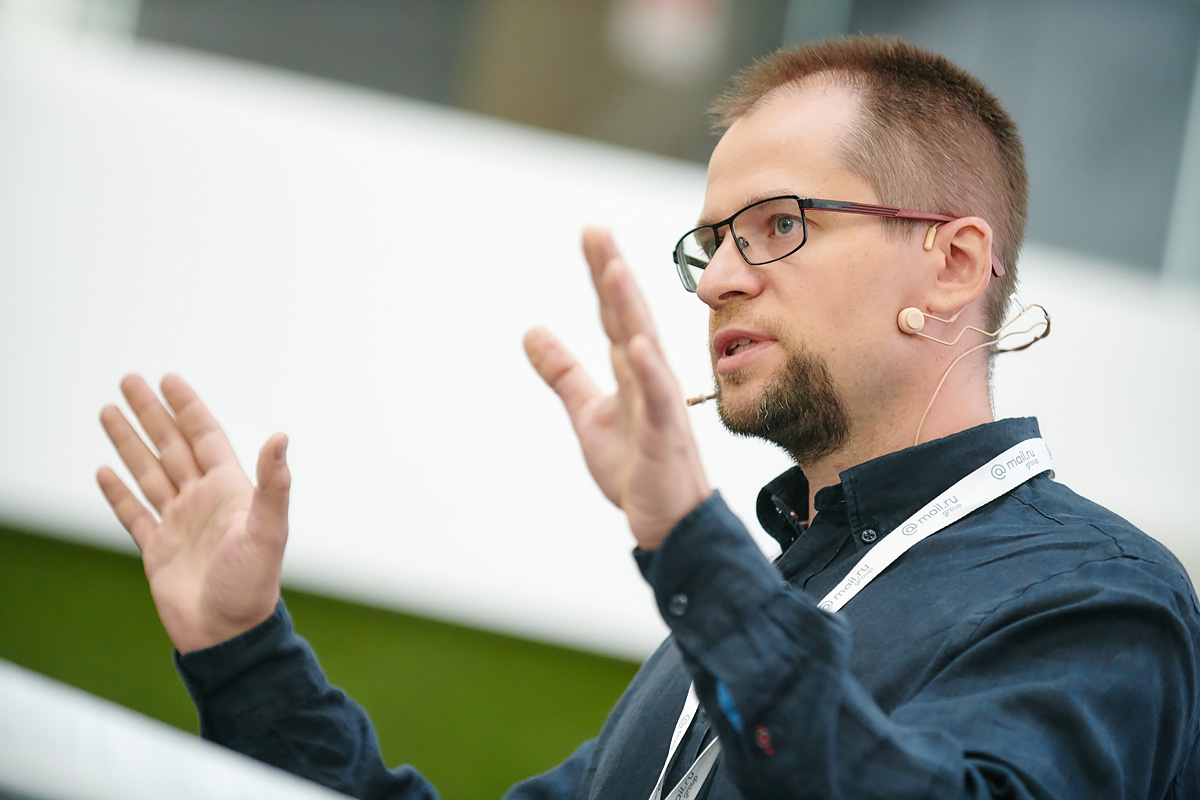In the wake of the conference T + Conf 2019
In mid-June, our office hosted the T + Conf 2019 conference, which featured many interesting reports about using Tarantool, in-memory computing, cooperative multitasking, and Lua to create high-load fault-tolerant services in Digital and Enterprise. And for all those who could not attend the conference, we prepared videos and presentations of all the speeches, as well as a bunch of great photos from the thick of the events, so to speak.


For 9 hours in two halls of T + Conf 2019, 16 reports could be heard. We talked about how Tarantool will continue to develop, how this DBMS can be used in a harsh enterprise. There were many practical Tarantool reports: about the cluster construction protocol, about omni-channel maintenance, about caches and replication, about scaling. And about a third of the speeches were about practical examples of using Tarantool in different companies and for solving various problems.
')
For example:
CI / CD applications on Tarantool: from an empty repository to production
Konstantin Nazarov
Konstantin spoke about the new approach in structuring and delivering applications in Tarantool:
Tarantool: now with SQL
Kirill Yukhin
The report is devoted to the architecture of Tarantool and its evolution. Cyril told why it is important to locate the database and the application server in the same address space, why Tarantool was made single-threaded, and why the database-in-memory needs a disk data storage mechanism. Then Cyril told about the latest developments of the Tarantool team: why we added the SQL syntax and how it can solve your problems.
How is Tarantool Enterprise useful?
Yaroslav Dynnikov
Tarantool Enterprise is not only valuable fur, but also a feature rich SDK. Jaroslav told how NT differs from the opensource version and what benefits it can bring. And there are a lot of differences in it: these are the cluster administration tools, the finished workflow of development, and the static build, which is not demanding in setting up the environment.
Vertical scaling of Tarantool using Intel Optane
George Kirichenko
George told how to use Intel Optane with Tarantool. Considered the effects of using Non-Volatile-mode for recording transaction logs, the possibility of vertical scaling of the In-Memory engine in conjunction with the Volatile-Intel Optane mode, good and bad load profiles in terms of throughput and latency. And also George will tell you about the different implementations of Intel Optane and compare them with reference to Tarantool.
SWIM - cluster construction protocol
Vladislav Shpileva
SWIM is a protocol for detecting and monitoring cluster nodes, distributing events and data between them. The protocol is special for its lightness, decentralization and independence of the speed of work on the size of the cluster. Vladislav talked about how the SWIM protocol works, how and with which extensions it is implemented in Tarantool.
In general, there was a sea of useful information!
If you could not come to T + Conf 2019, or want to refresh some moments in your memory, then here are the videos of all the performances, and here we put more presentations from them.



All our photos from the conference (you may find yourself on them): VK and FB .
We do not say goodbye to this, but we are waiting for you next year at T + Conf 2020, follow the announcements!


For 9 hours in two halls of T + Conf 2019, 16 reports could be heard. We talked about how Tarantool will continue to develop, how this DBMS can be used in a harsh enterprise. There were many practical Tarantool reports: about the cluster construction protocol, about omni-channel maintenance, about caches and replication, about scaling. And about a third of the speeches were about practical examples of using Tarantool in different companies and for solving various problems.
')
For example:
CI / CD applications on Tarantool: from an empty repository to production
Konstantin Nazarov
Konstantin spoke about the new approach in structuring and delivering applications in Tarantool:
- how to manage dependencies (rockspec + friends);
- how to write and run unit and integration tests;
- I will show a preview of the new test framework for applications;
- how to pack applications with dependencies (and why we chose static linking);
- How to get into production with systemd.
Presentation
Tarantool: now with SQL
Kirill Yukhin
The report is devoted to the architecture of Tarantool and its evolution. Cyril told why it is important to locate the database and the application server in the same address space, why Tarantool was made single-threaded, and why the database-in-memory needs a disk data storage mechanism. Then Cyril told about the latest developments of the Tarantool team: why we added the SQL syntax and how it can solve your problems.
Presentation
How is Tarantool Enterprise useful?
Yaroslav Dynnikov
Tarantool Enterprise is not only valuable fur, but also a feature rich SDK. Jaroslav told how NT differs from the opensource version and what benefits it can bring. And there are a lot of differences in it: these are the cluster administration tools, the finished workflow of development, and the static build, which is not demanding in setting up the environment.
Presentation
Vertical scaling of Tarantool using Intel Optane
George Kirichenko
George told how to use Intel Optane with Tarantool. Considered the effects of using Non-Volatile-mode for recording transaction logs, the possibility of vertical scaling of the In-Memory engine in conjunction with the Volatile-Intel Optane mode, good and bad load profiles in terms of throughput and latency. And also George will tell you about the different implementations of Intel Optane and compare them with reference to Tarantool.
Presentation
SWIM - cluster construction protocol
Vladislav Shpileva
SWIM is a protocol for detecting and monitoring cluster nodes, distributing events and data between them. The protocol is special for its lightness, decentralization and independence of the speed of work on the size of the cluster. Vladislav talked about how the SWIM protocol works, how and with which extensions it is implemented in Tarantool.
Presentation
In general, there was a sea of useful information!
If you could not come to T + Conf 2019, or want to refresh some moments in your memory, then here are the videos of all the performances, and here we put more presentations from them.



All our photos from the conference (you may find yourself on them): VK and FB .
We do not say goodbye to this, but we are waiting for you next year at T + Conf 2020, follow the announcements!
Source: https://habr.com/ru/post/459242/
All Articles